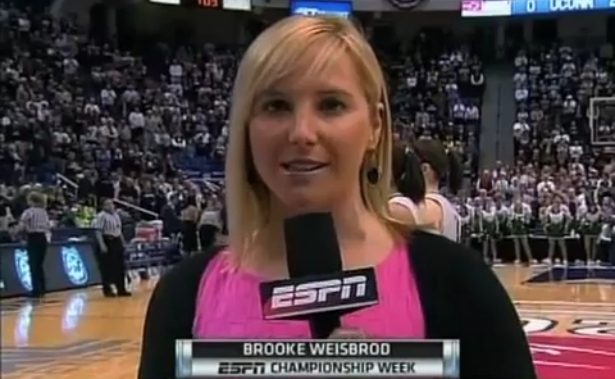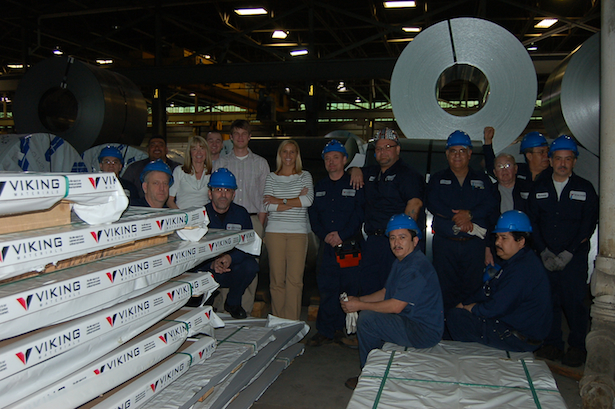Brooke Weisbrod: Woman of Steel

Brooke Weisbrod joined ESPN in 2003 as a women’s college basketball analyst, and since has added men’s basketball to her responsibilities. She primarily calls regular-season telecasts on ESPNU and ESPN2, and is also part of ESPN’s extensive women’s coverage of Championship Week and the NCAA Championship.
Weisbrod was most noted for playing college basketball at Coastal Carolina University, where in 2001 she was named the Big South Player of the Year, the Big South Scholar-Athlete of the Year and the NCAA Woman of the Year for South Carolina. She is the second player in school history to amass at least 1,000 points, 300 rebounds and 200 assists.
By day, Weisbrod has worked in steel sales for nearly a decade.
She tells Front Row about her thoughts regarding Championship Week, providing analysis for both men’s and women’s games, and how she became involved in the steel industry.
FR: As a former student-athlete and Big South Player of the Year, what memories do you have of Championship Week for the conference tournament?
Weisbrod: I remember feeling this overwhelming excitement knowing it was our one chance to play in the NCAA Championship. I wanted to stand on that ladder and cut down the net.
FR: What was the farthest your team advanced in the Big South Tournament, and in which year of your career?
Weisbrod: My sophomore and junior seasons, we made it to the Big South Finals, losing to Liberty University both years. We were crushed, and I had to leave the court while they were cutting down the nets. I don’t like to lose, it still hurts.
FR: How would preparing for the conference tournament differ from a regular-season game?
Weisbrod: My college coach, Alan Leforce, had 40 years of experience coaching men before he took over the women’s program at Coastal Carolina. He preached defense and playing hard, smart and together. His energy and focus were relentless, and as a team we embraced that persona, especially in the tournament.
For smaller conferences like ours, winning the tournament was our only shot to get into the “Big Dance.” The stakes are higher in the postseason. Each possession must be valued like it’s your last, and defensively, you have to be zeroed in on your game plan. We were successful getting to the finals because we out-defended most teams, except Liberty of course.

FR: Is it an easy transition going back-and-forth from calling men’s and women’s college games?
Weisbrod: I prepare the same way for every game, so there doesn’t feel like much of a transition. It’s great having the opportunity to call men’s games. I’m thankful to follow women like Doris Burke, who has already broken through and been successful not only on the college level, but in the NBA!

FR: What would you say is the biggest difference in calling the games?
Weisbrod: The pace of a men’s game can be much different than a women’s game. You have to be aware of that and know when to keep your points brief. A team like Marquette can get a steal and dunk in 3-5 seconds. The other unique aspect to a men’s game is watching it being played above the rim. The athleticism of some of these guys continues to amaze me, although there have been some unbelievably athletic plays in the women’s game this year. Alyssa Thomas of Maryland had a game-saving block against Duke that not only made SportsCenter, but will stay in the memory of Maryland fans for a long time!
FR: How did you become interested in becoming a broadcaster?
Weisbrod: Unfortunately my playing career in Germany was cut short by a back injury, but I was set on finding a career that I could stay involved in sports. While visiting Coastal Carolina, I was interviewed on headsets by Matt Hogue during the broadcast of a women’s game. We finished the interview and then started calling the action for a few minutes. The light came on, and I knew broadcasting was what I wanted. I went after it. My mom and stepdad were and still are very supportive of my career — they drove to Chicago from Cincinnati and helped produce a demo reel. It took a lot of hard work and a few years to break in, but I’m grateful every day to have this opportunity. To me, it’s the closest feeling to actually playing the game.
FR: Outside of the sports world, you have a day-time job in the steel business. Can you explain what you do, how you fit it all in and how you started in the business?
Weisbrod: I sell steel, stainless steel and aluminum to manufacturing companies. These companies take the sheets or coils that we process/cut out of larger coils that come from the mills and bend/punch/cut/stamp them into products. It’s everything from snowmobiles to food and agricultural equipment, military parts and even welding wire.
I’ve worked in steel sales for about eight years, and got started in this industry working for a scrap metal company (owned by a very successful woman). I remember getting a phone call from a recruiter asking if I was interested in a scrap metal recycling sales position and thinking, “What the heck is scrap metal recycling?” Turns out it is an incredibly interesting industry, and there is never a dull moment.
There are times when I’m walking through a factory that is 100 years old, or taking a steel mill tour in the middle of Pennsylvania to watch molten steel evolve into a coil, and even times where I have to venture into some questionable neighborhoods to cold call on new companies. You can’t afford to be shy in this business.
Some of my customers know I also work for ESPN, so it opens up an opportunity for me to get to know them on another level — we chat about sports and some of the guys have even gained an interest in the women’s game. Sales is still about building relationships, and I enjoy getting to know the people I work with, especially second or third-generation business owners. Manufacturing really is so vital to the success of our country.
My days during basketball season are typically a little insane. There isn’t one minute of my day that isn’t planned from 6 a.m. to about 11 p.m. I’m either at the office or on sales calls during the day, then after work I try to get a workout in before I start prepping for the next game.
Sometimes, I’ll be on the treadmill, watching a game on tv and emailing/texting/tweeting all at the same time. I usually fly out on Fridays and head back in on Sunday, ready for another work week. Once the season is over, I’m ready for a vacation!







